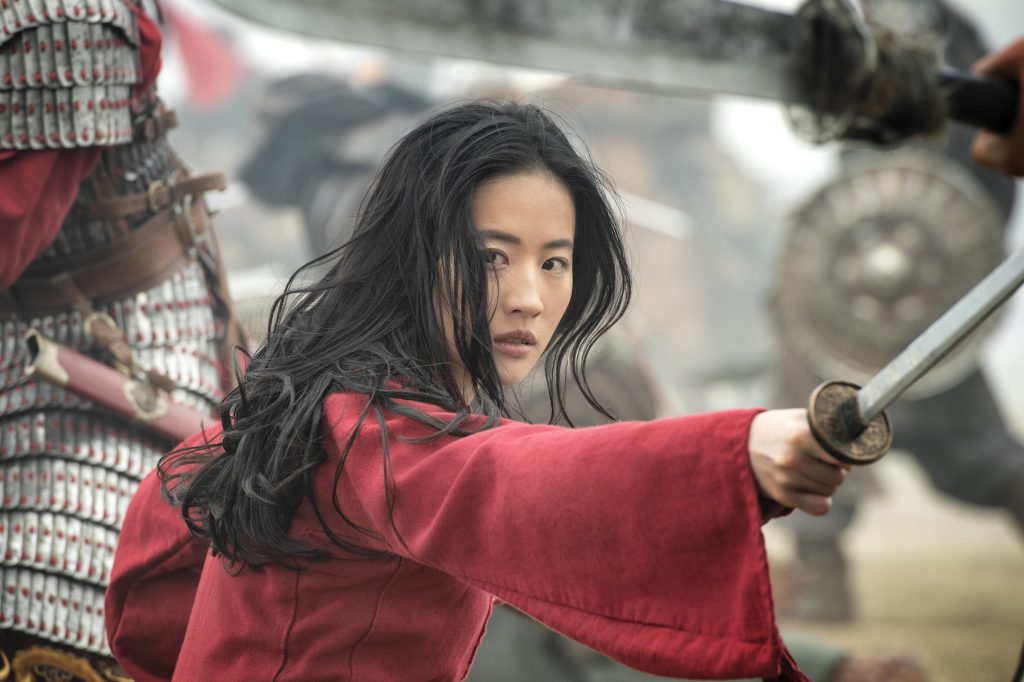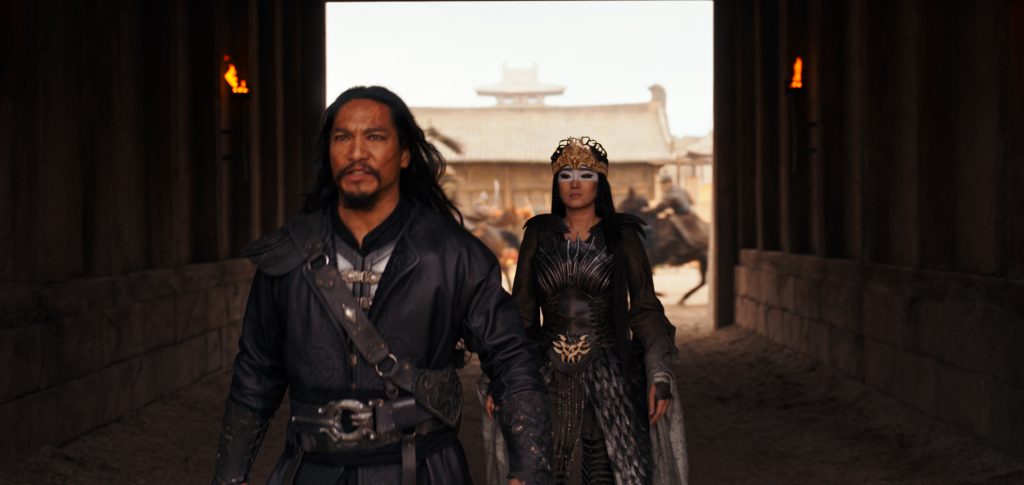January 14, 2023
by Carla Hay

Directed by Jean-François Richet
Culture Representation: Taking place in the Philippines and briefly in Singapore and New York City, the action film “Plane” features a white and Asian cast of characters (with some African Americans and Latinos) representing the working-class and middle-class.
Culture Clash: A Scottish-born airplane pilot working for a commercial American airline company leads a rescue mission after a plane that he is piloting makes an emergency landing in a remote jungle in the Philippines, and the survivors are held hostage by a gang of terrorists.
Culture Audience: “Plane” will appeal mainly to people who are fans of star Gerard Butler and well-paced action movies about heroic rescue missions.

As a semi-realistic action movie, “Plane” delivers exactly what it’s supposed to be: pure escapist entertainment full of gripping suspense. The movie has a few twists that don’t make the story as predictable as it could have been. “Plane” isn’t pretending to be award-worthy art, so viewers shouldn’t have those expectations at all.
Directed by Jean-François Richet, “Plane” (whose screenplay was written by Charles Cumming and J.P. Davis) has a somewhat misleading title because most of the action does not take place on a plane. The first third of the movie is about a commercial plane having to make an emergency landing in a remote jungle of the Philippines, due to an electrical malfunction and lightning striking the plane. The rest of the film is about what happens when the surviving passengers and crew members are stranded in the jungle and targeted by a gang of terrorists.
“Plane” begins by showing this ill-fated flight and who is on board for this trip. The fictional airplane company Trailblazer (which is based in New York City) is operating Flight 119, which is going from Singapore, with a planned layover in Tokyo, and then on to Hawaii. (“Plane” was actually filmed in Puerto Rico.) The captain of this flight is Brodie Torrance (played by Gerard Butler), a native of Scotland who has experience flying for the Royal Air Force of the United Kingdom. Brodie is a widower (his wife died three years ago) who lives in Hawaii. He has a daughter named Daniela (played by Haleigh Hekking), who is in her late teens.
It’s New Year’s Eve, and there are only 14 passengers on this flight. The co-pilot is Samuel Dele (played by Yoson An), who is originally from Hong Kong. Samuel is happily married with two pre-teen daughters. The three flight attendants on this trip are Bonnie Lane (played by Daniella Pineda), Maria Falco (played by Amber Rivera) and Isabella Yu (played by Michelle Lee), with Bonnie as the flight attendant who has the most obvious leadership qualities.
Not long before the flight is scheduled to leave, Brodie is informed by the FBI that an agent named Shellback (played by Remi Adeleke) will be boarding with a recently arrested fugitive who was found in Singapore, after the fugitive evaded capture for 15 years. This fugitive, whose name is Louis Gaspare (played by Mike Colter), is an American who is wanted for murder. Louis is brought on board in handcuffs, but Brodie thinks it’s best if the rest of the flight’s crew members do not know the details of why Louis is handcuffed.
Shellback and Louis are seated in the very last row of the plane. The other passengers are scattered in various other seats. Many of these passengers are not given enough screen time or dialogue to have distinguishable personalities. But other passengers stand out and affect certain parts of the story.
Matt Sinclair (played by Joey Slotnick) is an impatient and demanding American in his 50s. Maxwell Carver (played by Oliver Trevena) is a talkative and inquisitive Brit in his 30s. Two women in their 20s are friends and travel companions: Brie (played by Lily Krug) is American, and Katie (played by Kelly Gale) is Swedish. Katie and Brie are both giggly and excited to be on this trip.
While boarding the plane, one of the passengers notices that the plane is an old model and makes a comment about it to Brodie. In a defensive but pleasant tone, Brodie says, “These planes are indestructible.” And when someone in an airplane disaster action movie brags about the plane being indestructible, you know what that means: The plane is going to malfunction.
Even before this happens, there’s tension on the plane because a few of the passengers have noticed that Louis came on board in handcuffs. Brie and Katie were originally assigned to sit in the seats now occupied by Louis and Shellback, but Bonnie discreetly tells Brie and Katie that they have to move a few rows up. When Brie and Katie are seated, they start to take a selfie photo.
However, Louis gets very agitated at the thought of being in the background of their photo, and he barks at them when they’re about to take the picture: “Can you not do that?” Later in the movie, when Maxwell starts making a video recording with his own phone, Louis has an even angrier and more extreme reaction. How much of a loose cannon is Louis? And can he be trusted?
It’s already shown in the “Plane” trailer and other marketing materials that Louis is eventually taken out of his handcuffs to help Brodie in the jungle when the surviving people on the plane come under attack by the gang of terrorists. (Brodie is the one who makes this decision to uncuff Louis.) The leader of the terrorist gang is a ruthless thug named Junmar (played by Evan Dane Taylor), who wants to hold these survivors hostage for big ransom money. It’s something that the gang has done before when visitors have the misfortune of getting stranded in this jungle.
Meanwhile, back at Trailblazer headquarters in New York City, company officials are frantically trying to locate the plane and its occupants, since the plane has dropped off the radar and is considered missing. Trailblazer chief executive Scarsdale (played by Tony Goldwyn) is leading the search-and-rescue efforts. It’s explained in the movie that the Philippines government won’t get involved because the jungle is in a part of the country overrun with terrorists that the Philippines government has given up trying to control. Therefore, Scarsdale makes the decision to hire a private group of mercenaries to help.
“Plane” has some adrenaline-packed action scenes that go in some unexpected directions, while some of the “shoot ’em up” scenes come very close to looking like generic video-game combat. However, the dynamics between Brodie and Louis make “Plane” a little more interesting than the average action flick. There’s nothing particularly special about any of the acting in the film, but no one is outright horrible either. “Plane” is an overall satisfying and serviceable thriller for anyone seeking this type of entertainment.
Lionsgate released “Plane” in U.S. cinemas on January 13, 2023.


